There are two types of travelers. The Type A person who needs a minute-by-minute, peer-reviewed itinerary for their vacation and those who want to walk down the street and eat at the first restaurant they see. Then, they marry each other.
This is precisely the case of me and my husband, Gustavo. He loves to go to places that he loves, whereas the idea of repeating a destination gives me the hives. Ever the achiever, I have a running list of every country I’ve been to and even if it’s not my first thought, I will admit that part of my vacation planning process optimizes around my desire to tick more boxes.
But it’s not just about finding the perfect location, I need to do a comprehensive deep-dive of everything the location has to offer. If I leave a place and then see later that there was a stunning cafe or vintage store that I didn’t make it to, an overwhelming wave of FOMO hits me.
So I optimize to avoid regret by reading every single thing out there about the destination, building out a ridiculous Google Maps list so there’s no corner of a street that I don’t have a bookmark for, and asking for recommendations compulsively until I leave.
The great irony here is that planning a vacation stresses me out. And when I leave the trip, no matter how much I’ve done, I don’t feel like I’ve done it all.
How did vacationing become something to achieve? As much as I’d like to think it’s just a me problem, I conducted a poll on my Instagram and 130+ people said they get vacation FOMO too.
How did vacations become a performance?
I confronted this head-on last week when my husband Gustavo and I started planning a summer holiday.
After basically sprinting through the last six months of planning a wedding, getting married internationally, buying an apartment, renovating the said apartment, and then moving, Gustavo and I were exhausted to the bone. That TikTok sound “Ohh… I Wasn’t Sad, I Just Needed A Holiday” played over and over in my head as we hit our third day of painting until midnight. As we worked away, Gustavo waxed poetic in longing for a beach holiday with no plans, obligations, or schedules.
Even the Type A traveler in me agreed.
The next day, I started planning like I always do. I opened my favorite travel websites Yolo Journal, Outliers Guide, and Small Luxury Hotels to start looking at options. My tabs filled with links as I opened every hotel in Greece, without any discernment on where we might want to go. This is how I usually plan a trip: by getting absolutely, insanely overwhelmed by options. Once I narrow it down to two probably great options I’m paralyzed and finally, at the urging and exasperation of Gustavo, I finally choose, and spend the vacation with the sneaking suspicion that I’ve picked the wrong one.
I’ve done this before. Last October, I suspected that Gustavo might propose on our trip to Mallorca and I worked myself up into a tizzy trying to pick the perfect hotel. I ended up making a 4 x 4 chart comparing price against location, benefits, and drawbacks. Romantic.
Reader, I admit I lost sight of the point of vacation. It was not a mistake I was going to make again.
Why do we need to get so much from our vacations?
Scarcity. First, people are taking fewer vacations. A 2024 study by Expedia reported that Americans take the least vacations globally, averaging just 11 days. (USA Today) And when people are traveling some of them are doing it under the guise of “quiet vacationing,” which is basically working through a vacation so you don’t have to take days off (Fortune). Sounds restful! Not.
Spend. Travel is more expensive than ever. CNBC reported that luxury hotel rates reached “peak levels” this year, with average daily rates up 70% compared to 2019, according to the luxury travel company Virtuoso.
There is an increasingly blurred line between business and pleasure, especially for people who are self-employed or freelance. In my own experience as a part-time writer and content creator, I’ve come to learn that there is no free lunch (or vacation). If I’m invited on a press trip for free, there is the expectation that something will come from it. Even if I’m not traveling for a story, I find myself still capturing content so that I can repurpose it later or looking at everything for a possible future pitch. I remain on my phone and not on vacation. Not very fun to have as a travel companion.
Social Media. There is a nearly unlimited amount of places to go and Instagram and TikTok have only made us even more aware of them. As the NYT reported back in 2022, “For Gen Z, TikTok Is the New Search Engine”. A senior vice president at Google said, “In our studies, something like almost 40 percent of young people, when they’re looking for a place for lunch, they don’t go to Google Maps or Search. They go to TikTok or Instagram.” Two years later, I feel like that’s probably even higher now.
Enter “Euro Summer,” a TikTok hashtag with 158.6M posts. Being inundated with this volume of content about luxury travel makes it hard to separate noise from signal. If everyone is on an lavish vacation, why shouldn’t I be too?
In a way, vacation has become a performance. I’m as guilty as anyone for participating. But who’s to blame?
What has social media done to travel?
Contrary to what the viral New Yorker essay “The Case Against Travel” said about traveling, I do think that being a tourist is a way to better yourself. If I had never left my hometown in Michigan, I wouldn’t have become who I am. I wrote my study abroad capstone project about the people I met when I was traveling who I called “Los Abiertos,” people who went out of their way to show me their culture. Living outside of the United States and engaging with other cultures has shaped my worldview.
Going to a place to post about it is a less great reason to travel, one that I admittedly am guilty of.
wrote about this in her essay “You Don't Need To Document Everything. She said, “There’s a sense now that something didn’t happen if you don’t share it. There are young people who wouldn’t understand going to an event, travelling somewhere, being in a relationship, if they couldn’t post about it.”I recently wrote an article for Insider about phone-free travel, which is something that I’m hoping to do more of this year. Reading Freya’s writing made me think critically about some of the trips I’ve planned in the past to be able to say I went to a place. Her whole essay is worth reading, but I’ll pull out this quote because I think it’s immensely valuable when thinking about travel:
Aspire to be someone who gets so caught up in the moment they forget to share it; who protects their personal life while everyone else hands theirs over so freely; who can see the value in a moment without needing strangers to validate it for them.
–
If we look at the trend of “European Summer,” I think it’s important to examine it with a critical eye. Who is paying for Euro Summer? Unless everyone I follow on Instagram is suddenly independently wealthy, I have to think it’s credit card companies who are footing the bill. This is where conscious content consumption can be helpful. Putting on blinders and muting people whose posts make you feel that low vibration feeling of jealousy or comparison. Just because it feels like everyone is taking indulgent trips, it doesn’t mean you should. Your travel spend should be in congruence with your life.
As
pointed out in her essay, How the f💰💸k is everybody living like this? lifestyle creep has infiltrated travel.“It’s easy to say that I don’t think regular people need to spend $1,200 on stretchy pants. But what about travel? What about experiences? Who is to say who should or should not spend a grand a night to stay at Il Pelicano?
Not me. But social media drove this shift too: how the hell has suddenly everybody been to Italy?
-
Recommendations from trusted sources help cut through the noise
It’s convenient to point fingers at social media for the dire state of information overwhelm when it comes to travel. I’ve really enjoyed learning more about algorithms through the work of New Yorker writer
who wrote Filterworld: How Algorithms Flattened Culture. Admittedly, I haven’t read the full book yet because then I won’t be able to live in my current ignorance-is-bliss-state about my phone usage.Instead, I’ve been microdosing the truth by listening to his various podcast appearances. I enjoyed his conversation with
on this podcast. Specifically, when he spoke about why recommendations are actually helpful.Pandora: “Do you think we are peak decision fatigue or do you think it’s going to get worse?”
Kyle: We are definitely exhausted from making decisions. I think part of the problem is just the nature of the internet the way it emerged in the past fifteen years. There is just too much stuff on the internet. No human being can confront that volume of stuff and so we need filters. We need curation. We need things to sort it out for us because we can’t make all those decisions.
Personally, I love travel recommendations. Some of my favorite social media follows are these curators, who as journalists, photographers, designers, and content creators, show me beautiful corners of the world I haven’t seen yet. Think Yolanda Edwards, Athena Calderone,
, Blanca Miró Scrimieri, among others. They are aspirational. Their content looks like art. I love following them. And honestly, I would love for my vacations to look like theirs. I want to go to Greece and I want to do all the things that they do, without looking like I’m directly copying them and instead that my family friend brought me along to their neighborhood spots, albeit for the fact that I don’t have any Greek family friends.I think the trick here is to know when to stop. If you’re trying to copy and paste the Greece trip of Yolanda Edwards, former creative director of Condé Nast Traveler who has thirty plus years of travel journalism under her belt, on a tenth of the budget and a third of the time, you’re going to fail.
Recommendations are great inspiration, not instructions. A starting point. If you try to do everything someone else has done without adapting it to your life, needs, and budget, it’s going to break down. Instead, choose one or two of their recommended gems to incorporate into your trip and leave space for your own discoveries. As my mom has said all throughout my life, “Everything in moderation.”
Now I brainstorm offline before booking travel online
If you’ve read my other writing about sobriety, food, and dating, you might know that I’m not great at moderation. If you’re like me, I suggest you try to plan your trip offline first and then go-online to book it.
As I wrote about wedding planning (another domain that has been completely inundated with visual imagery and noise so that you can lose all bearing on what you actually like), I’ve found it helpful to start first by defining the purpose of the trip. Set the constraints. Figure out why you’re traveling.
This narrows the scope enough so that then you can use recommendations to help you plan the trip you want, instead of booking the trip you feel like you “should” do.
Plan with Purpose in Mind
With this awareness, I went back to Gustavo and outlined exactly what we wanted out of our vacation. One word: Rest. Spend-the-day-on-the-beach-all-day-and-eat-dinner-in-a-towel kind of rest. As little logistics as possible. One flight. No connections. Walkable to the beach. (I learned my lesson from renting a car in Mallorca that me driving on vacation adds way too much stress.) Good food. Peace.
With these parameters outlined, the trip became obvious. It would be a fly-and-flop, a term that I had learned recently when pitching a story about adventurous honeymoons. Fly one place and flop onto the beach. Heaven forbid, eat at the hotel. The kind of vacation that I would have avoided at all costs in the past, because it didn’t accomplish enough. Now, I see how ridiculous that is.
Booking became easy.
I still wanted to go to Greece and there are a handful places you can fly into that get you to the beach without needing take a ferry. Then I sorted by price and the list narrowed down to Rhodes, Crete, Kos, and Corfu. Any Greek island that could only be reached with a ferry was marked off the list (If I missed a potential spot, please don’t tell me). Even though I had identified that Patmos was the cool and trendy place to go to in Greece this summer, I let that go. This trip wasn’t to have a finger on the pulse, it was to have my butt in the sand.
As I stared at my excess tabs, I began to close them. A few days ago, Gustavo had received an email for discount flights to Greece and had been joking that he booked us on one of them without researching, knowing that it would make my brain combust. But I went back to his message and decided to go with the place he had suggested.
I opened Mr. and Mrs. Smith, a trusted vetter of hotels that one of my wisest travel friends Chloe Frost-Smith writes for (yes I’m reformed but I’m not going to go on vacation completely unadvised!) Sorting by cost, I picked a hotel where we could walk to the beach. The price was right, the photos looked lovely, and with a quick read-through, I booked it. What a relief it was to be decisive.
When planning a vacation, it’s important to ask yourself who and what it’s really for. It’s clear to me now that this trip is for rest. And the rest is secondary.


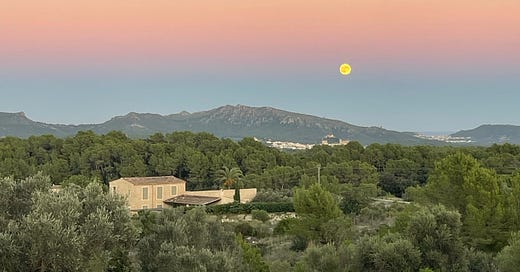



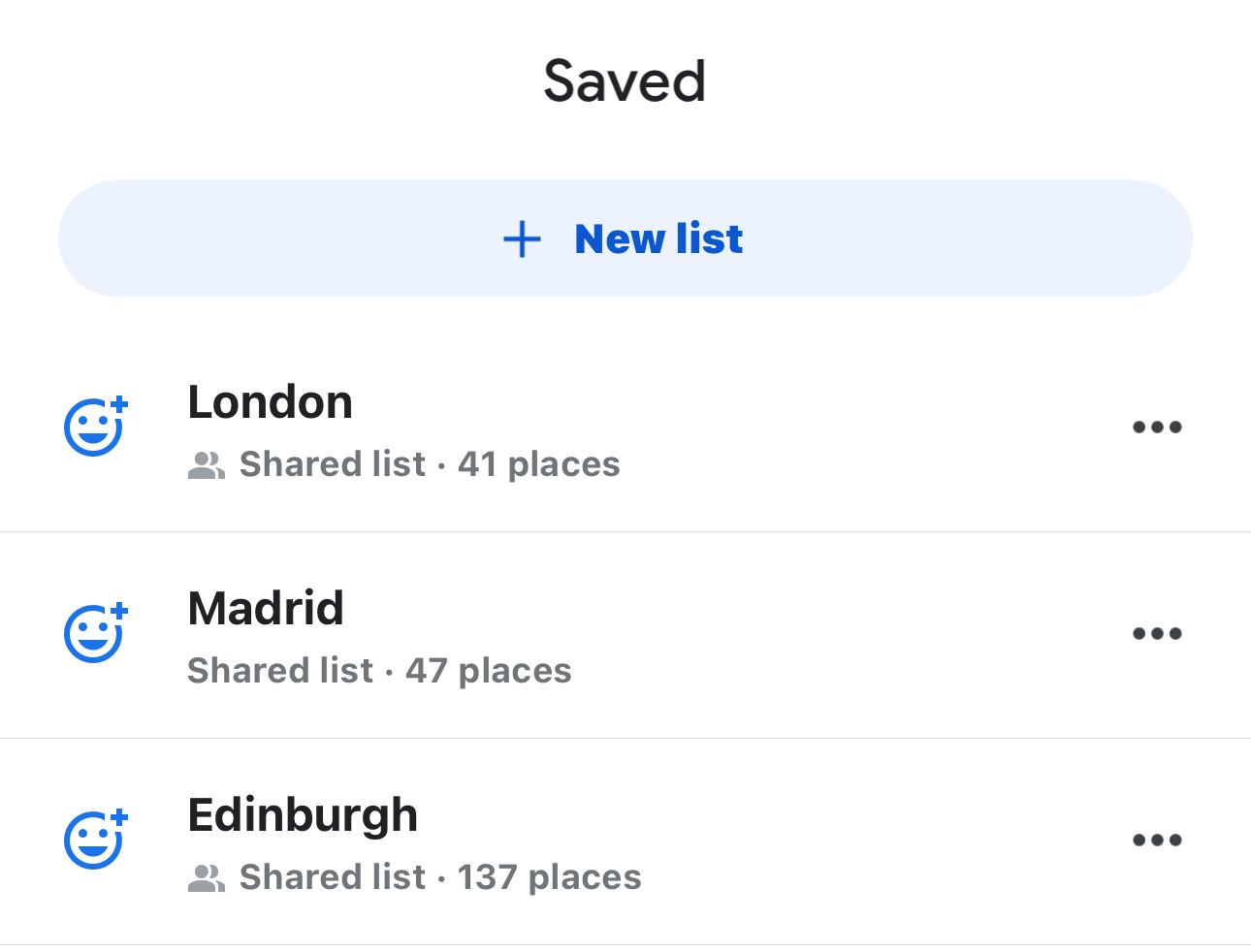
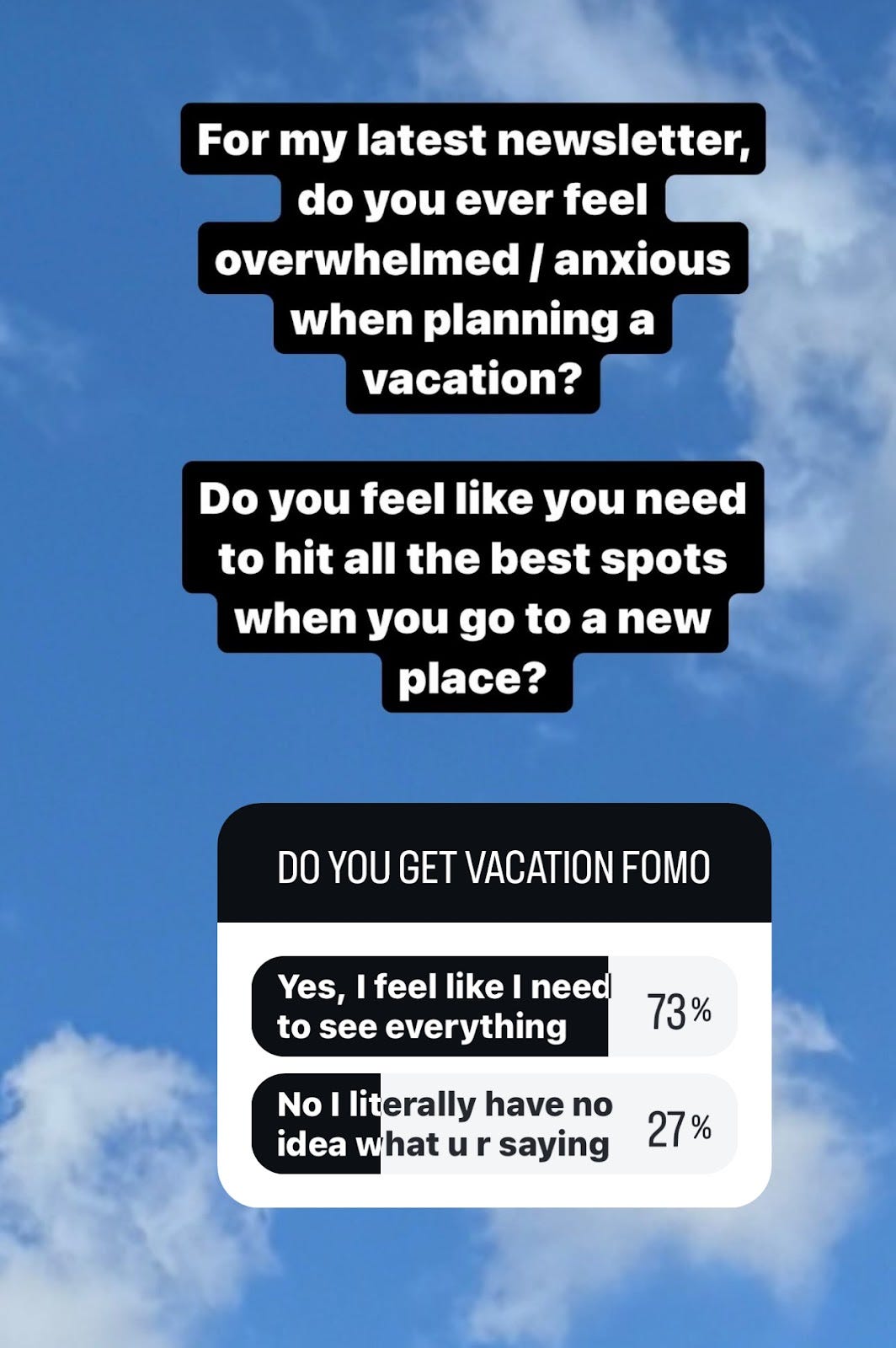

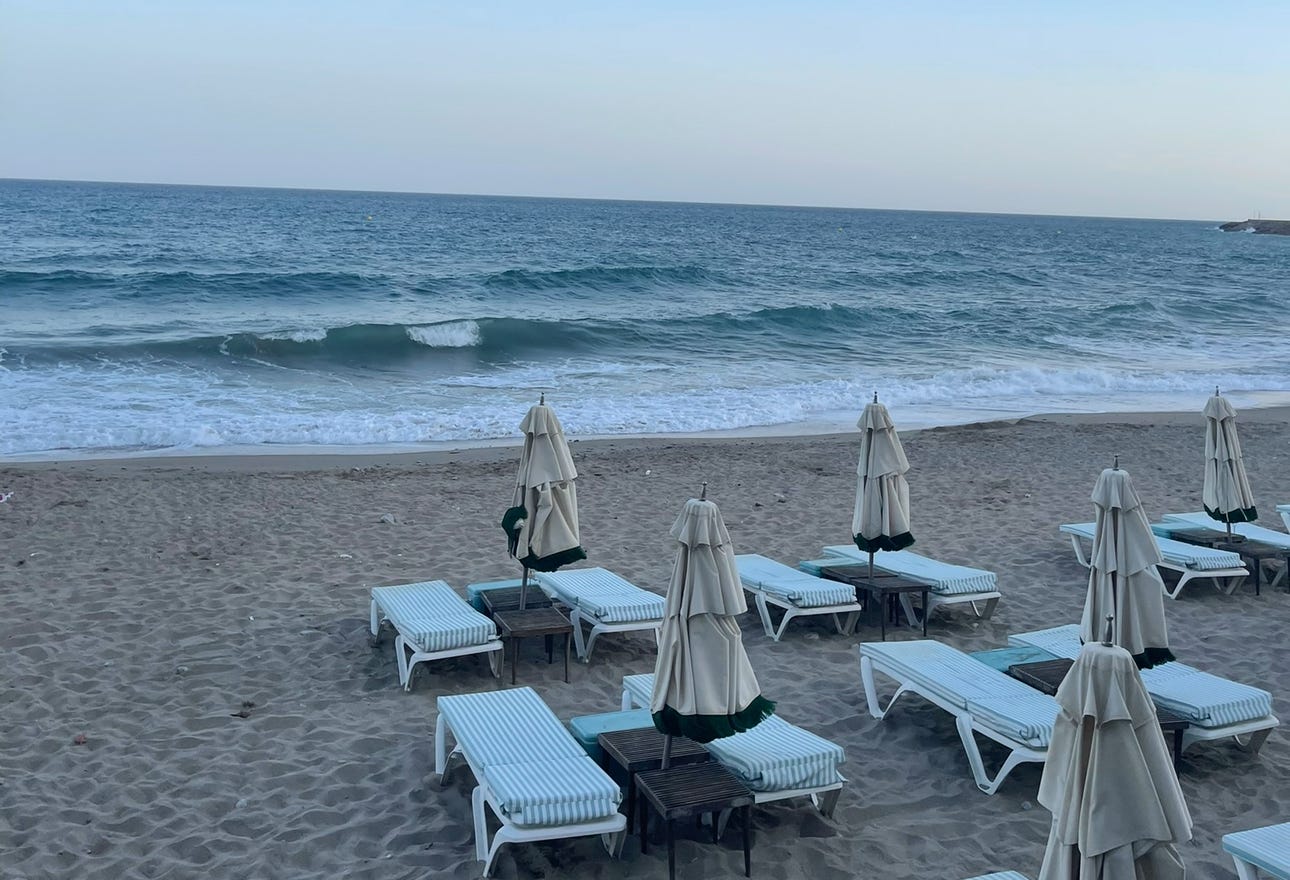
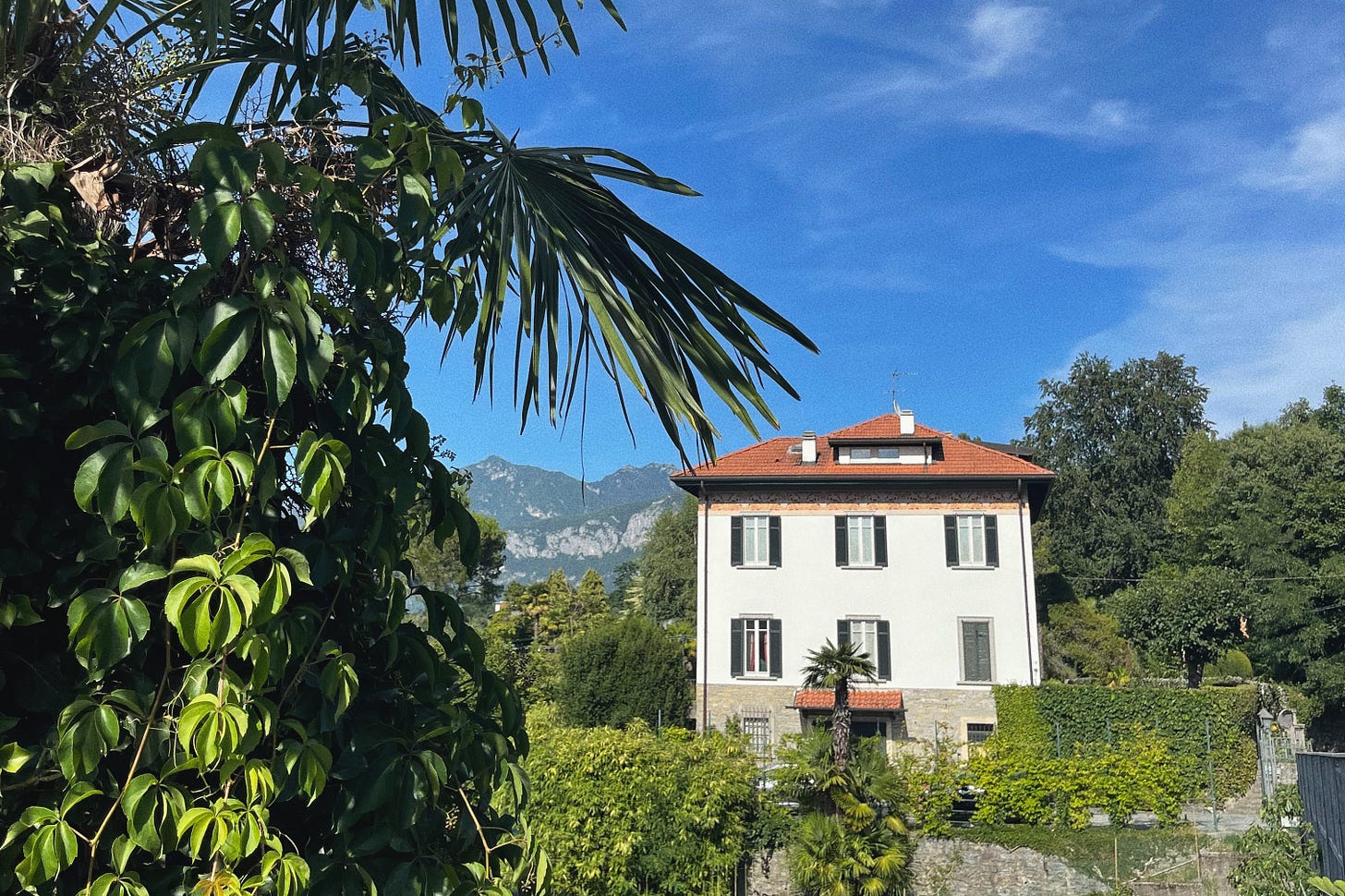
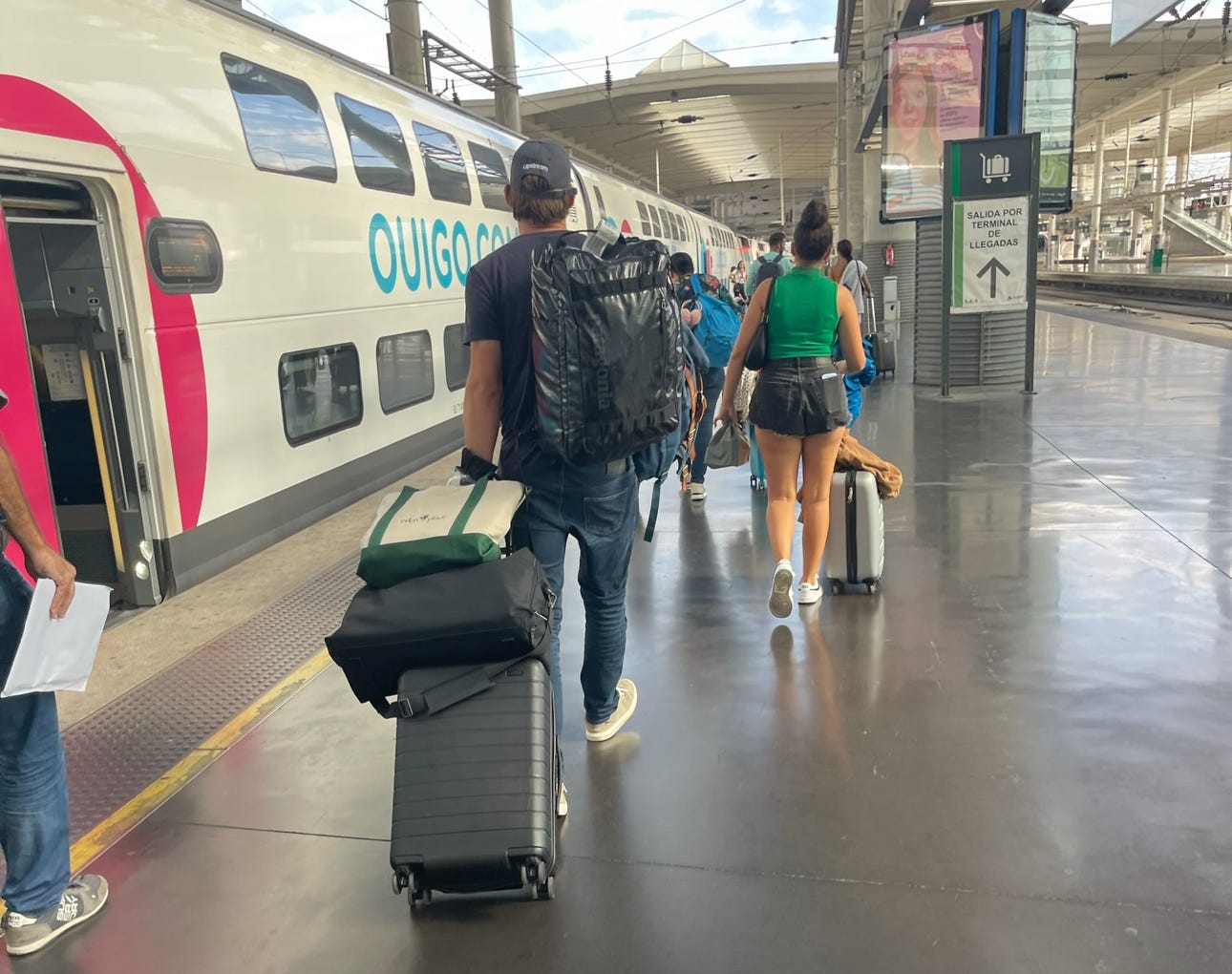
I enjoyed this newsletter SO MUCH. And that is because I see myself in you. Honestly, when has vacationing become a competition? This May, my husband and I traveled to Albania. A country that had never been on my radar. But we discovered it and said, let's go! We only had four days there so we thought "okay, let's pick a hotel by the beach and just chill". We found a beautiful down and a hotel right by the sea. And I absolutely loved it. We did a tiny bit of adventuring but mainly spent time at the beach. Even though I enjoyed the trip to the fullest, there is now that nagging feeling of "did we do enough?!". Even though "doing things" wasn't the point of the trip at all. But I just can't shake that feeling. I hear so much about the beauty of Albania and the different regions there. And honestly, I feel like I missed out. But I don't want to feel that way. Because I loved my vacation. It's just so hard to shake it.
turning on the 'intentionality level' when we do things in life is so important. starting planning offline is crucial. it helps reflect internally at first, which is key for long-term satisfaction. thanks for sharing, great read 🫶